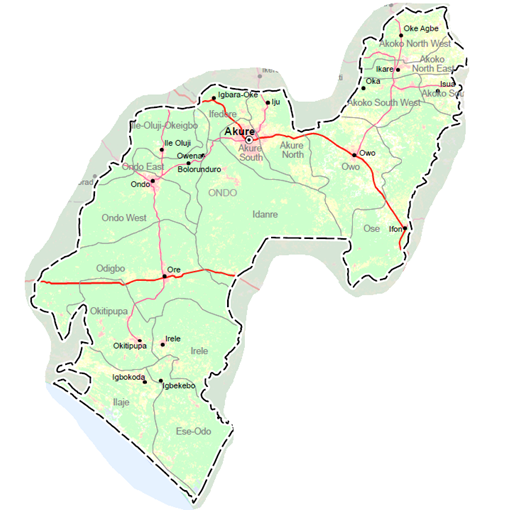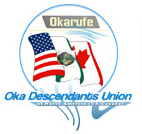ABOUT US
OUR ROOTS & HERITAGE: A BRIEF HISTORY OF ỌKÀ ÀKÓKÓ
By: Akin Adams
This brief history was specially written for Oka Descendants Union North America website visitors to enable them to know more about our ancestral roots. The write up is qualitative in nature, employing ethnographic research methodology. Ethnography is a type of qualitative research that gathers observations, interviews and documentary data to carry out a specific work. The work will be divided into the following segments; the location and geography, origins and early settlements, current configuration, culture, occupation, tourist attractions as well as Ọkà Àkókó poetry praise.

Ondo state map showing 18 local government areas and their headquarters
Location & Geography
Ọkà Àkókó is a town in Akoko South-West Local Government Area of Ondo State Nigeria, West Africa. Many of its areas is situated on a plateau with tails off in extremely picturesque pattern of lofty hills. It covers an area of about thirty square kms. It is made up of 5 distinct geographical settlements of Ayegunle-Oka, Oke-Oka, Iwaro-Oka, Okia-Oka and Isimerin-Oka. These settlements areas can further be divided into quarters and units to be fully discussed under current configuration.
The town is bounded in the East by Epinmi and Ipe, in the West by Akungba and Supare in the North by Ise Iboropa and Ugbe in the South by Oba and Ikun towns. Ọkà Àkókó is the headquarters of the Akoko South-West local government area of the state.
There were several factors that went into determining where people lived, settled in those days. These factors centered on providing the basics of life such as food and water, and most importantly the security of defending their abode in the time of war. Hills served this well and especially during the inter-tribal wars, as all the Ọkà Àkókó communities usually joined forces together, to repel any invaders especially the conquering armies of the Nupes and Edos. While all the surrounding towns and villages were over-run and depopulated, Ọkà Àkókó remained unconquerable due to its hilly topography. Later, re-settlement to plain area by some of the earlier communities was affected leading to the present geography of the town.
ORIGINS/EARLY SETTLEMENTS
Ọkà Àkókó traces its origins back to the ancient city of Ile-Ife, which is regarded as cradle of the Yoruba’s; the second largest ethnic group in Nigeria. The name Ọkà is a contracted form of Okarufe meaning Oka-Ife. Oral traditions have it that there were Page 4 of 9 three waves of migrant groups; all from Ile -Ife that led to the establishment of Ọkà. These three groups were known as the Sirin, Siru & Sifa
The group under Asin and another group under Okikon journeyed along different routes till each group arrived at the precincts of some lofty hills known then as Kukuruku hills. The group under the Asin settled in the Southern part of the hills and became known as Okaodo while the group under Okikon settled in the Eastern part of the hills and this group became known as Okaroke. Later on, another group, the Sifa led by Oba Owa-Ikan came and settled at the Western and Northern peripheries of the same Kukuruku hills.
| Group | Quarters |
| Sirin | Ibaka, Ikese, Korowa, Okia |
| Siru | Ebinrin, Okaodo, Owake, Iwonrin and Ebo |
| Sifa | Owalusin, Agba, Ikanmu, Iboje, Owaase and Idofin |
Oka-Akoko three major groups

One of the Oka-Akoko Mountains

A street in Oka-Akoko
CURRENT CONFIGURATION
Politically, it is currently composed of fifteen quarters. Within each quarter there are sub-units as illustrated in alphabetical order below:
# | Quarter | Sub-Units |
1 | Agba | Akusa, Osan*, Owalagba |
2 | Ebo | Okedegba, Okeliso |
3 | Ebinrin | Ilakere, Ilala |
4 | Ibaka | Odole (Ojulubere (odeleje, ojulebere, okedeefo) Odegbere (ehin ode, okeede, ode koko) Igia (ilasin, idemo, abuwe) Odedin (eyinogbe, asikede, odebakoko, ode-Asin, odoruwa okeruba, odekate, okemate, shirin) |
5 | Iboje | Iboola, Igalaada, Okemdon, Odokuro |
6 | Idofin | Odogure, Odode, Okede, Okede pare |
7 | Ikanmu | Abisi, Epiri, Simerin*, Oraa, Uba, Ewu |
8 | Ikese | Okeruwa, Ododun, Ooporo, Ikundo |
9 | Iwonrin | Odeoke, Odeabu, Odeogun, Esia |
10 | Korowa | Odole, Isiri, Ejomefa |
11 | Okaodo | Okela, Odoju |
12 | Okia | Isanmoke, Igede, Iroho, Isabodo |
13 | Owalusin | Okeowa, Lesse, Ododo, Ojulimogun, Osuru |
14 | Owake | Odeoloja, Odeagbe, Odeoke, Odeayin, Odooguudu, Okunro |
15 | Owase | Odede Oje, Oketele, Okedeaoro |
OUTPOST SETTLEMENTS | ||
a. Ayegunle and Ayepe are the two outpost settlements of mixed quarters | ||
b. Shimerin* is outpost of Ikanmu quarter | ||
c. Osan* is outpost of Agba quarter | ||
| ||
Ọkà Àkókó quarters and units
CULTURE
Ọkà Àkókó is a historic and culturally rich community with a blend of moral values. Some of the extant Yoruba moral values that is practiced and inculcated from one generation to the other include:
(i) Respect for Elders: Elders are highly regarded in Ọkà Àkókó culture. Respecting elders is fundamental, and younger individuals are expected to always show deference in both speech and behavior wherever they may find themselves.
(ii) Family Orientation: The family is the cornerstone of the people. Extended families often live close together, and there is a strong emphasis on familial loyalty and support.
(iii) Community and Collectivism: The people value communal living and cooperation. There is a sense of responsibility towards one another, and community welfare is prioritized over individual interests.
(iv) Hard Work and Diligence: A strong work ethic is emphasized, with the belief that hard work leads to success and social status.
(v) Education and Knowledge: Education is highly valued, and acquiring knowledge is seen as a pathway to personal and communal development.
(vi) Hospitality: The town is known for its warmth and hospitality. Guests, visitors are treated with great respect and generosity.
(vii) Integrity and Honesty: Upholding one’s word and being honest in dealings is crucial. Trustworthiness is a valued trait.
(viii) Civility and Politeness: Social interactions are often characterized by politeness and formal greetings, reflecting a deep-seated respect for social norms.
OCCUPATION
In terms of occupation, majority of Ọkà Àkókó people are predominantly migrant farmers, engaging in subsistence farming. They produced foodstuffs like yams, maize and cassava as well as some cash crops such as cocoa, coffee and rubber etc.

Maria Grotto
TOURIST ATTRACTIONS/EVENTS
Hills can be a popular tourist attraction for several reasons, including their scenic beauty, adventure activities; Ọkà Àkókó is endowed with beautiful hills slotted in a circular formation round the town. No doubt, hills Ọkà Àkókó are attractive work of nature and beauty to behold.
Oke-Maria Catholic Grotto
Another notable tourist attraction is the Oke-Maria Catholic Grotto, which attract visitors all year round.
Rev. Father Seminati, who came all the way from Lokoja to Ọkà Àkókó and found the place quiet for prayer and meditation. He spent some few days on the mountain praying and received some inspiration while he saw an apparition in form of Holy Mary, the mother of Jesus Christ”
According to him, from the report he heard, the apparition was a one-off thing but Seminati marked the spot and pronounced it sacred and people started coming to the place to pray and receive blessings and healings. He said the apparition site was marked to make the place sacred, and it is where the statue of Holy Mary stands today. In December 1974, the whole diocese gathered to place the statue at the site of apparition and consecrate the hill as a place of prayer. It has since then become an international Marian Pilgrimage Centre.
Important Oke Maria link for exploration:

Oke Maria Hill Top

One of the recent Oka Day festivals attended by the Ondo state governor; Lucky Aiyedatiwa and his deputy in August 2024.
Oka Day Yam Festival
Despite all culture exterminating influences of colonial prejudices, western education, foreign religions, and the modern influences of globalization, Africa still boasts of copious surviving and functional traditional festivals. One such is the annual new yam festival in Ọkà Àkókó. It is a festival that marks the beginning and end of the farming season. In many ways, it is a celebration of life, bountiful harvests, common accomplishments, shared culture, and the community's well-being.
Every first Saturday of August for the people of Ọkà Àkókó, is always a special day, it marks the official start of the consumption of new yam. During the New Yam Festival, investors, good deeds and other accomplishments within the community are also recognized. Chieftaincy titles are given to deserving individuals, especially sons and daughters of Ọkà Àkókó as well as non-indigenes alike. The Oka Yam Festival has grown to become a rallying point and a festival of unity among Oka sons and daughters, and the entire Ondo State as a whole.
Important Oka day Yam Festival for exploration

Traditional drummers at Oka day Yam festival

Another scene August 2024 Oka Day Yam Festival
Ọkà Àkókó Oriki (Praise Poetry)
Oriki” is a form of praise poetry or a praise name. It is a genre of Yoruba verbal art through which individuals, families, and communities express their identities and feelings. They pass down family lineage, connections and achievements across generations. Through oriki, children learn about their ancestors and understand their place in the community.
Oriki can be used to praise a person, a deity, a town, or even an event. It encompasses the practice of praising and glorifying God through eloquent and poetic expressions. They also meant to highlight and honor a person’s, town’s attributes, accomplishments.
Oriki aren’t just flowery compliments. They tap into something deeper such as providing insight into Yoruba philosophy, values, and beliefs about human purpose and potential. They reflect the power of words to shape identity and destiny. Each family in Oka have their own praise poetry, the focus here will be to highlights some of the Oka-Akoko town praise poetries:
| Praise Poetry | English Translation |
| Omo OKarufe, onigbo irumole y’ajojimawo | Offspring of Okarufe, the owner of the forest of thousand demons which a stranger must not enter |
| Awa ome arougun masa, arote ma beru | We, the Offspring of him who sees war and does not flee |
| Awa ome arogun berin no keere | We, the Offspring of him who sees conspiracy and burst into laughter |
| Awa ome asiwaju ogun, Ekiti bo, asupayin | We the Offspring of him who goes before a war, Ekiti come, the latecomers |
| Awa ome oloke igegelige, | We, the offspring of the owner of the highest mountain |
| Ome oje le reo, ome arara gbude | Offspring of the owner of the house of money |
| Awa ome d’ mowo dudu jehun, akosu t’aparo ore | Offspring of him who eat with black hands and dish out yams to the bush fowls |
| Awa ome a mu ‘hun kekere tani ore | Offspring of him who has abundance and gives out plenty |
